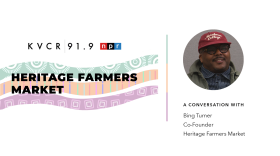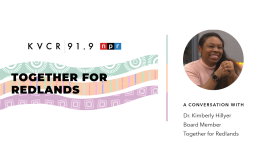Maya Gwynn
With KVCR Public Media, I'm Maya Gwynn with Black Perspectives IE, a show where we learn about the amazing things members of the Black community are doing in the Inland Empire. My guest today is Fatima Nelson, Program Manager of Workforce Development for the Inland Empire Labor Institute. Thank you so much for being here.
Fatima Nelson
Thank you so much for having me.
Maya Gwynn
So to start, can you tell us about your role at the Inland Empire Labor Institute and how it connects to advancing workforce development in our region?
Fatima Nelson
So I've been with the Labor Institute for about a year now, and I'm their program manager for workforce development. The Institute is the nonprofit arm of the Labor Council, and the IE Labor Council is the largest labor council in the state. It's an umbrella organization for about 90 unions, and it represents about 300,000 working families. And so what I'm tasked to do as manager for workforce development is find more ways to build and grow programs that provide high wage opportunities for our folks. We're doing that by growing union-based apprenticeship programs, centering our unions in a lot of these conversations that are happening. A lot of energy around economic development and workforce development.
Maya Gwynn
When a lot of people think of labor leadership, they often think of traditional unions or public sector jobs. What are some high wage, high growth sectors in the Inland Empire that people might not immediately think of, but should consider?
Fatima Nelson
Well, I'm actually working with a regional investment initiative called Thrive Inland SoCal. And this is a state funded initiative that the governor has kind of funded, and each region puts together an economic development plan, and the plan that the IE region has put together has identified three sectors in particular that are high growth. So that's advanced manufacturing, cybersecurity, and then also clean economy. And what we're finding, and what I'm running around the region telling our young people and residents alike is that there are so many trade opportunities that are connected to all of these developments that we're going to see happening over the next couple of decades in this region. So all of the money will be going to making sure we have enough electricians, to make sure that we have enough operating engineers, iron workers. That was a term I wasn't familiar with before I became familiar with the trades, pipe fitters, HVAC technicians, Boilermakers, Sheet Metal Workers. We're talking about people who are making $40 an hour, $50 an hour once you've kind of completed your training. So what we always say to folks is, yes, please. Push young people towards higher education in college. And you know, when they want to reach for those resources, encourage them as much as possible, but let's make sure that we're giving them all of the information, especially, you know, our young people of color. Over the decades, we used to be the artisans, often the craftsman class in this country, and so I'm hoping that we can rebuild that. What we always say is that the trades is the four year alternative, because you're still talking about being skilled, being an expert in a particular craft, and it takes, you know, it's a three to four year process, depending on what the trade is, but they compensate you. Well, when you finish that training.
Maya Gwynn
Can you spotlight a few black labor leaders in the Inland Empire who are doing important work in lesser known sectors, and what kind of impact they're having?
Fatima Nelson
Oh, I could go on. So we have Leonard Cross, who is a business agent. I met him recently. He's an operating engineer. He's been working a lot in the high desert area, working on these crucial projects - these transportation and infrastructure projects that we're all going to benefit from. See, that's the beauty of being in a trade, because a lot of them can ride by these public works, a bridge or a building, and say, I helped create that and they'll be saying that for generations to come. There's Leonard Cross, there's Dr. Nosakhere Thomas, who's, you know, of the Black Worker Center, who has been doing so much in this region to just highlight that we are a voice to be reckoned with as African Americans in this region, and we have a unique perspective to offer the labor community, even internally, because there's some struggles, let's just be transparent, still around intercultural issues and things, they're still growing. It's a microcosm of society. But he is doing important work in pushing that conversation. I would say Khadeejah Soper, who is African American trainer for the IBEW, the electricians. And so she actually leads a nonprofit called Tradeswomen Sisterhood. And what they do is they, with intention, reach out to women, especially women of color. And she is this young, brilliant mind that is training cohorts of electricians in the math, you know, the pre calc that you need to pass an electricians class. She's leading that fight. She's going to be kind of the lead trainer, I think, for hundreds of young minds that are going to be working on electric green transition projects for the future.
Maya Gwynn
All right, so we're gonna go into our rapid fire portion. Since you told me a little bit about your acapella background, if your work had a theme song, what would it be?
Fatima Nelson
At this point, this is gonna sound really crazy, but Squabble Up.
Maya Gwynn
You're the fifth person to mention Kendrick. I love it. If you had to teach a master class or give a TED Talk on a random skill that you have. Silly to serious. What would it be?
Fatima Nelson
I'm gonna go serious, and I'm gonna say maybe a TED talk about engaging our young people in a conversation about legacy.
Maya Gwynn
Wow. What's your favorite IE restaurant, or just like a landmark that reminds you of the Inland Empire?
Fatima Nelson
Oh, Cafe Organix. It's in San Bernardino. It's a sister that owns that shop, and the decor is, I mean, it just makes you feel like you're home. And it is vegan food. It is some of the best food that I have ever had. And I've considered myself a foodie.
Maya Gwynn
Okay, I'm gonna check it out. Looking ahead. What gives you hope about the future of labor leadership in the Inland Empire. And how can listeners get involved or support this movement?
Fatima Nelson
What I say to our young folks or just residents alike, if you are looking for an opportunity, one that I think can bring meaningful work and high wage as well and benefits and a sense of being a part of a collective, reach out to the Labor Institute. Check out our website. We have a whole list of apprenticeship opportunities available there, and who you can contact to find out more about that. You know, come to some of the events that we hold where we are asking our community for ideas for how we can better connect the unions to them so that you know it's not a mystery how you can get involved, But just reach out to us, because that's why we're here. We want to make sure that we demystify all of that.
Maya Gwynn
Awesome. Thank you so much for being here today.
Fatima Nelson
Thank you for having me. It was really fun.
Maya Gwynn
Fatima Nelson is Program Manager Workforce Development in Inland Empire Labor Institute. Support for this segment comes from Black Equity Fund at IECF, advancing racial equity and supporting long term investments in black led organizations in Riverside and San Bernardino counties. Join us again next week for Black Perspectives IE. For KVCR Public Media, I'm Maya Gwynn, thank you.







